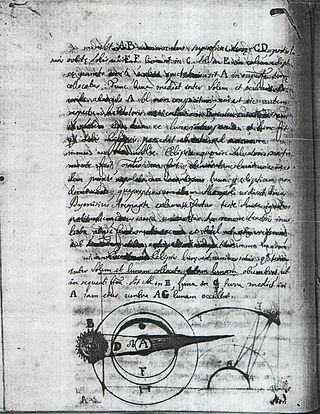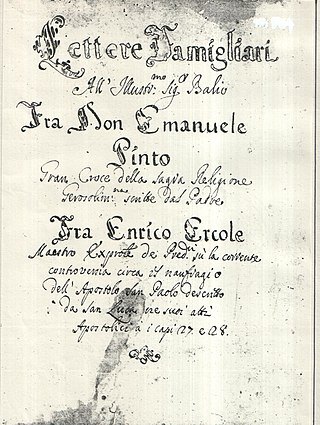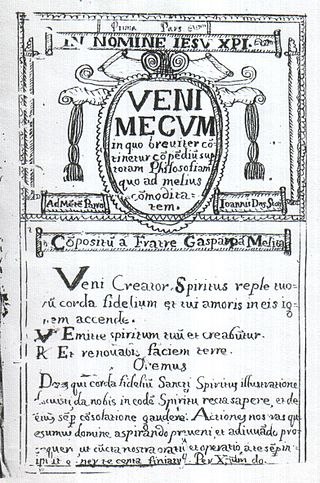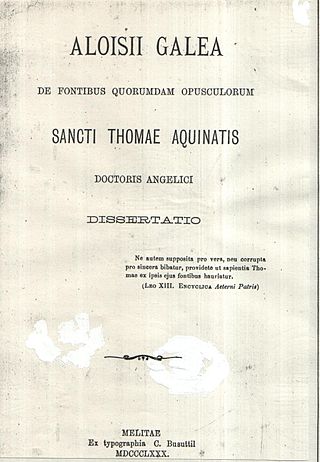Dominic Borg (17th century) was a minor Maltese philosopher who specialised in logic and rhetoric.
Contents

Dominic Borg | |
|---|---|
| Born | Unknown |
| Died | Unknown |
| Occupation | Philosophy lecturer |
Dominic Borg (17th century) was a minor Maltese philosopher who specialised in logic and rhetoric.

Dominic Borg | |
|---|---|
| Born | Unknown |
| Died | Unknown |
| Occupation | Philosophy lecturer |
He probably lectured at the Collegium Melitense in Valletta.[ citation needed ] The extant works of Borg reveal practically nothing in terms of biographical data. What they do attest to is his philosophical prowess and his clarity of thought. [1]
Only three works of Dominic Borg are known to exist. Two on rhetoric and one on logic. Others might have been lost or are currently displaced.
Borg’s De Arte Rethorica: Brevis Notitia (A Short Note on the Art of Rhetoric), a work in Latin completed in 1668, is held in manuscript form at the National Library of Malta as MS. 718#10. [2] It is his most relevant extant work to date. The manuscript is made up of forty folios, and is compiled as part of a miscellaneous volume of works. Basically, Borg’s manuscript is a study of rhetoric, and is composed as a series of epistles. The first epistle is an investigation into the teachings of Aristotle. Throughout all of the epistles, Borg makes liberal use of Cicero.
Another extant work on rhetoric from Borg’s hand is Compendio Brevissimo delli piu inutili precetti per comporre epistola (A Very Short Collection on the Minute Rules for Writing Epistles), composed in 1668. [3] This manuscript is also in Latin, and is held at the National Library of Malta as MS. 718#11). It contains only twelve folios, and is organised in chapters (some of which are divided into smaller parts). The work investigates the nature of epistles, and the proper manner with which epistles should be composed. The work is not particularly speculative. It is more of a short and technical exercise in rhetoric. Again, Cicero is quoted profusely.
Borg’s work on logic is called Brevis Introductio ad Logicam Artis (A Brief Introduction to the Art of Logic), composed in 1669. [4] The manuscript is in Latin, and held at the National Library of Malta as MS. 718#2. This work is made up of just sixteen folios, and is actually a very simple piece of writing where Borg examines the various distinctions of logic. The composition is divided under various sub-titles.
John Matthew Rispoli was a major Maltese philosopher of great erudition. He was held in high esteem by the Grand Masters of the Knights Hospitaller Order, the Bishops of Malta, the Viceroys of Sicily, cardinals, bishops, inquisitors, and the common people. Perhaps the most eminent Maltese philosopher of the Middle Ages, the various extant writings of his are witness to his philosophical aptitude and dexterity as to his high calibre as a philosopher. These qualities were highly appreciated during his lifetime, in Malta as in France and Italy. He lived a busy life, both as an intellectual and as an administrator. He was professor of philosopher at various institutions of high education, an able preacher, and an official at various posts within the Dominican Order, of which his was a member. He was an avid aficionado of music, and was talented with playing musical instruments. Though the fame of holiness accompanied him in his life, this did not deter the Inquisition from suspecting him of heresy, and keeping him in its dungeons for fourteen months. When he died, he was given an almost state funeral.

Thomas Cauchi was a minor Maltese philosopher who specialised in law.
Saverius Pace was a minor Maltese philosopher who specialised in physics.

Jerome Leocata was a major Maltese philosopher who specialised mainly in metaphysics. His long academic career in philosophy and theology was very hampered by his many administrative commitments. His writings, however, bear witness to his thinking skills and his philosophical prowess. He possessed a clear and systematic mind, consistently endeavouring to give a sound philosophical basis to his speculations. No portrait of him is yet known to exist.
Maximilian Balzan (1637–1711) was a minor Maltese mediaeval philosopher who specialised mainly in physics and art. He was also an accomplished theologian. He had a very successful administrative career, both in the civil as well as the ecclesiastical sphere, and he further gave a significant share in academic circles.

Henry Regnand was a minor Maltese philosopher who specialised mainly in logic and metaphysics.
George Sagnani was a minor Maltese philosopher who specialized mainly in ethics and morals.

Rosarius Mary Hagius (1673–1757) was a minor Maltese philosopher who specialised mainly in metaphysics.
Constance Vella (1687–1759) was a major Maltese philosopher who specialised mainly in physics, logic, cosmology, and metaphysics. Vella's speciality is that, despite being a Scholastic, he was not an Aristotelic-Thomist one, but rather an Aristotelic-Scotist philosopher, that is more in the line of John Duns Scotus.

Henry Ercole was a minor Maltese philosopher who specialised mainly in ethics and logic. He enjoyed great esteem from his contemporaries, both as an administrator and a philosopher.

Gasper Grima (c.1680–1745) was a minor Maltese philosopher who specialised mainly in metaphysics and logic.
Francis Dominic Bencini (1664–1744) was a minor Maltese philosopher who specialised in apologetics.

John Constance Parnis (1695–1735) was a major Maltese mediaeval philosopher who specialised mainly in metaphysics, physics, and logic.
Joseph Demarco (1718–1793) was a Maltese medical practitioner, a scientist, and a major philosopher. His areas of specialisation in philosophy were mostly philosophical psychology and physiology.
Angelo Pirotta, O.P. was a Maltese philosopher and educator. In philosophy, his areas of specialization were epistemology and metaphysics.

Joseph Rizzo was a minor Maltese philosopher and theologian who probably specialised in logic.

Dominic Bezzina was a minor Maltese philosopher who mainly specialised in physics. He also dealt with logic.
Jerome Inglott (1776–1835) was a Maltese philosopher and theologian. His areas of specialisation in philosophy were chiefly metaphysics and ontology. He held the Chair of Philosophy at the University of Malta (1822–27), and was one of the Philosopher-Rectors at the same university (1826–33).

George Caruana (1831–1872) was a Maltese minor philosopher mostly interested in epistemology. He held the Chair of Philosophy at the University of Malta (1859–72).

Aloisio Galea (1851–1905) was a Maltese theologian and minor philosopher. He specialised mostly in moral philosophy.